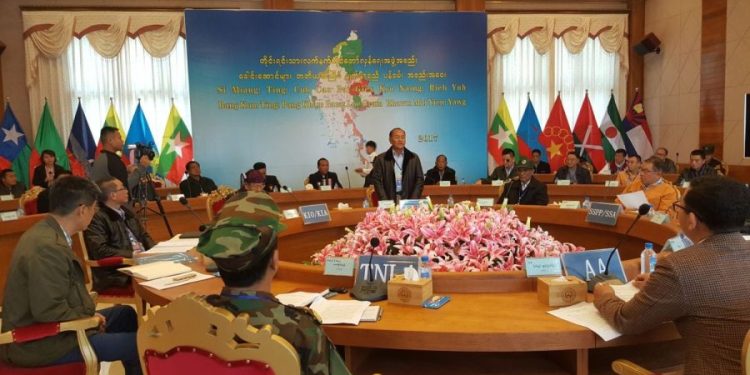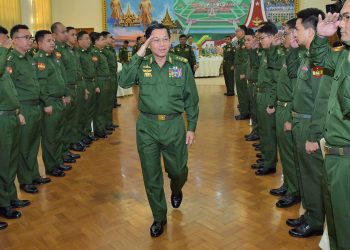Leaders of the Federal Political Negotiation and Consultative Committee (FPNCC), a coalition of seven ethnic armed organizations (EAOs) based in northern Myanmar, met the Chinese special envoy to Myanmar, Deng Xijun, in China last week.
The meeting, which was held in Kunming, Yunnan province, followed discussions between the FPNCC members in Panghsang in Myanmar’s Wa State, an autonomous enclave run by the United Wa State Army (UWSA), on March 15-16.
“We welcome and support China’s involvement to end the domestic conflicts in Myanmar,” the FPNCC said in a statement following the March 15-16 meeting, adding that it would “continue working together with the Chinese government to improve the stability of border areas.” The coalition also thanked China for the assistance it had provided during COVID-19 outbreak.
The FPNCC is made up of the UWSA, Kachin Independence Army, National Democratic Alliance Army (NDAA), Shan State Progress Party (SSPP), Arakan Army, Ta’ang National Liberation Army, and Myanmar National Democratic Alliance Army.
The FPNCC opted out of signing the Nationwide Ceasefire Agreement with the Myanmar government and military, and is seeking alternatives to build peace and solve political problems in Myanmar.
In its statement, the FPNCC vowed to establish a federal, democratic Union by making permanent peace with Bamar-majority areas. “There might be various ways to establish the Union, but in the end, we ethnic people will have to rely on ourselves,” it said.
The Irrawaddy was unable to reach FPNCC members to ask about their latest meeting with the Chinese representative at the time of reporting.
The latest meeting between the FPNCC and Deng is the third since Deng was appointed Chinese special envoy to Myanmar in December.
At their second meeting in February, Deng pointed out the lack of unity among FPNCC members, saying some members are holding talks with the Myanmar military regime while others are not. He urged all of them to hold talks with junta boss Min Aung Hlaing.
Deng has also met Min Aung Hlaing twice in Naypyitaw. The two discussed promotion of ties and trade between the two neighbors, according to junta-controlled media.
A political observer said the seven EAOs might give in to pressure from China and meet with the regime, but it was unlikely that China could compel some of the members into agreeing a truce with the regime.
Of the FPNCC members, only the UWSA, SSPP and NDAA have held talks with the regime since the coup.
“For five years between 2016 and 2020, China urged them to join peace talks but with the exception of the Wa and NDAA, they refused to do so. The EAOs that were fighting the regime continue to fight it,” said the observer.
China however has the power to bar EAOs from fighting along the border, and this has allowed the Myanmar military regime to maneuver its troops from northern Shan State to launch operations in Kayah (Karenni) State, the Chin Hills, and Sagaing and Tanintharyi regions, said observers.

















